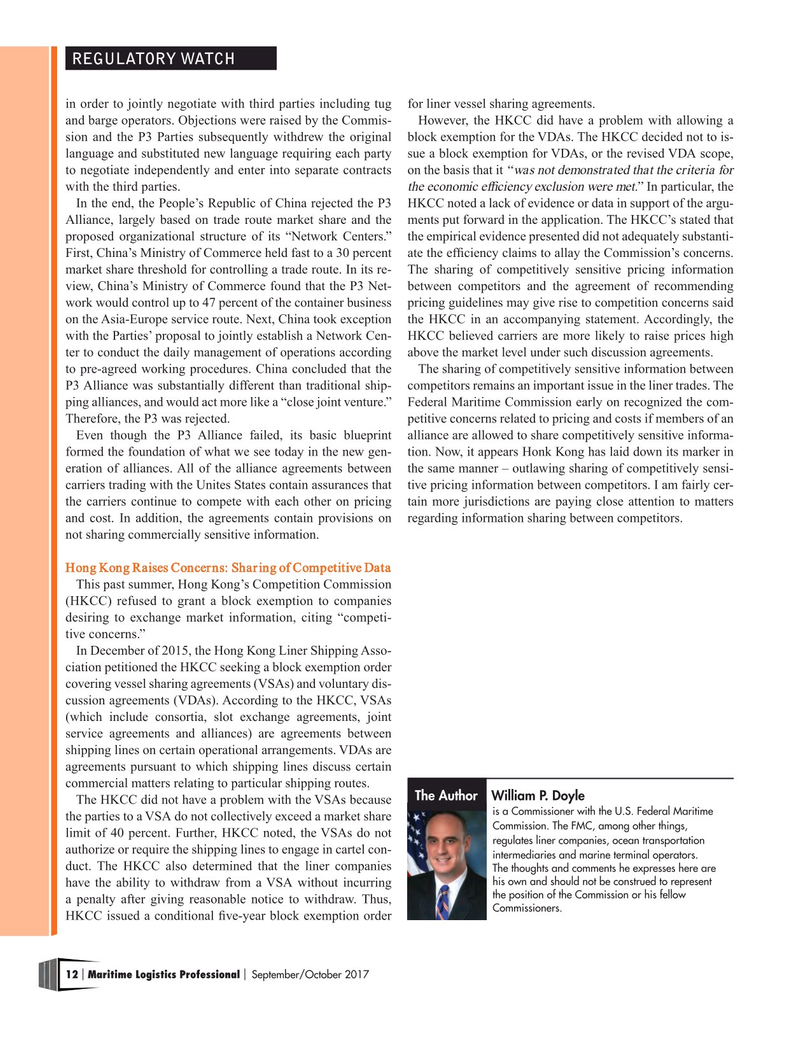
Page 12: of Maritime Logistics Professional Magazine (Sep/Oct 2017)
CONTAINER PORTS
Read this page in Pdf, Flash or Html5 edition of Sep/Oct 2017 Maritime Logistics Professional Magazine
REGULATORY WATCH in order to jointly negotiate with third parties including tug for liner vessel sharing agreements. and barge operators. Objections were raised by the Commis- However, the HKCC did have a problem with allowing a sion and the P3 Parties subsequently withdrew the original block exemption for the VDAs. The HKCC decided not to is- language and substituted new language requiring each party sue a block exemption for VDAs, or the revised VDA scope, to negotiate independently and enter into separate contracts on the basis that it “was not demonstrated that the criteria for with the third parties. the economic effciency exclusion were met.” In particular, the
In the end, the People’s Republic of China rejected the P3 HKCC noted a lack of evidence or data in support of the argu-
Alliance, largely based on trade route market share and the ments put forward in the application. The HKCC’s stated that proposed organizational structure of its “Network Centers.” the empirical evidence presented did not adequately substanti-
First, China’s Ministry of Commerce held fast to a 30 percent ate the effciency claims to allay the Commission’s concerns. market share threshold for controlling a trade route. In its re- The sharing of competitively sensitive pricing information view, China’s Ministry of Commerce found that the P3 Net- between competitors and the agreement of recommending work would control up to 47 percent of the container business pricing guidelines may give rise to competition concerns said on the Asia-Europe service route. Next, China took exception the HKCC in an accompanying statement. Accordingly, the with the Parties’ proposal to jointly establish a Network Cen- HKCC believed carriers are more likely to raise prices high ter to conduct the daily management of operations according above the market level under such discussion agreements. to pre-agreed working procedures. China concluded that the The sharing of competitively sensitive information between
P3 Alliance was substantially different than traditional ship- competitors remains an important issue in the liner trades. The ping alliances, and would act more like a “close joint venture.” Federal Maritime Commission early on recognized the com-
Therefore, the P3 was rejected. petitive concerns related to pricing and costs if members of an
Even though the P3 Alliance failed, its basic blueprint alliance are allowed to share competitively sensitive informa- formed the foundation of what we see today in the new gen- tion. Now, it appears Honk Kong has laid down its marker in eration of alliances. All of the alliance agreements between the same manner – outlawing sharing of competitively sensi- carriers trading with the Unites States contain assurances that tive pricing information between competitors. I am fairly cer- the carriers continue to compete with each other on pricing tain more jurisdictions are paying close attention to matters and cost. In addition, the agreements contain provisions on regarding information sharing between competitors. not sharing commercially sensitive information.
Hong Kong Raises Concerns: Sharing of Competitive Data
This past summer, Hong Kong’s Competition Commission (HKCC) refused to grant a block exemption to companies desiring to exchange market information, citing “competi- tive concerns.”
In December of 2015, the Hong Kong Liner Shipping Asso- ciation petitioned the HKCC seeking a block exemption order covering vessel sharing agreements (VSAs) and voluntary dis- cussion agreements (VDAs). According to the HKCC, VSAs (which include consortia, slot exchange agreements, joint service agreements and alliances) are agreements between shipping lines on certain operational arrangements. VDAs are agreements pursuant to which shipping lines discuss certain commercial matters relating to particular shipping routes.
The Author William P. Doyle
The HKCC did not have a problem with the VSAs because is a Commissioner with the U.S. Federal Maritime the parties to a VSA do not collectively exceed a market share
Commission. The FMC, among other things, limit of 40 percent. Further, HKCC noted, the VSAs do not regulates liner companies, ocean transportation authorize or require the shipping lines to engage in cartel con- intermediaries and marine terminal operators. duct. The HKCC also determined that the liner companies
The thoughts and comments he expresses here are his own and should not be construed to represent have the ability to withdraw from a VSA without incurring the position of the Commission or his fellow a penalty after giving reasonable notice to withdraw. Thus,
Commissioners.
HKCC issued a conditional fve-year block exemption order 12 Maritime Logistics Professional September/October 2017 | |

 11
11

 13
13
